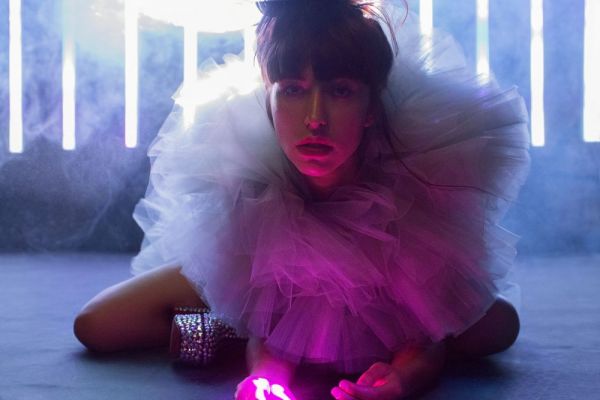Home > Home - Featured
02/06/2018
New Zealand pop artist Kimbra plays Wonder Ballroom Thursday, Feb 8
By SARAH PAYNE // “I think music is a real symbol of unity,” Kimbra said. “It defies gender, race, culture, language – everyone understands melody and groove, and it brings people together."
Portland, you are in for a treat this week: New Zealand singer and songwriter Kimbra takes the Wonder Ballroom by storm this Thursday, Feb. 8, joined by indie rock band Arc Iris.
While many might only recognize her name from that one Gotye song (the only Gotye song worth remembering), Kimbra is an acclaimed artist in her own right. A year before winning a Grammy for Best Pop Duo with Gotye (making her only the third New Zealand artist to win a Grammy), Kimbra won Best Female Solo Artist, Best Pop Album and Breakthrough Artist of the Year awards at the 2012 New Zealand Music Awards for her first album, Vows, marking her as an artist worth watching all on her own.
Fast forward several years later, and Kimbra is known now for her own eclectic sound, which even she describes as imaginative, creative, experimental and soulful, and, of course, catchy, with musical influences from artists like Stevie Wonder – “I’m a big, big fan,” she said,” – to Frank Ocean, the late Amy Winehouse and even indie rock bands like Grizzly Bear. And, of course, Prince.
“I’ve been listening to Prince all my life, so I think he’s kind of rubbed off a lot on my music,” Kimbra said.
There was never really a defining moment, when Kimbra knew music was her life – actually, she said, it had really always been there since her childhood. “I was writing since as young as 8 or 9, just silly little songs,” she said.
At 17, she was offered a big management deal and the chance to make her debut record, which is when she realized she could make music her career.
“I’m really glad that I took the opportunity,” she said, “because I think [music] is what I would be doing one way or another. But to be able to do it on a world stage and give people the gift of music as my job? I feel very lucky to do that.”
But it’s not just the gift of music – it’s the gift of unification, too.
“I think music is a real symbol of unity,” she said. “It kind of defies gender, race, culture, language – everyone understands melody and groove, and it brings people together.
“And it heals. I know because I see it in the crowd, the faces of people who feel understood when I sing a song to them.”
Before she begins writing, or even performing, Kimbra said she will take the time to center herself, to find silence and to take the time to just be still before entering that creative place. It’s also about finding that connection with people.
“When it comes to writing, it’s like you’re trying to get into that state of calm-like mentality. You’re trying to think about everything being instinctual, and not over-thinking too much,” she said. “It’s the same with performance.”
When she’s writing, Kimbra often draws inspiration from her environment. She has moved to a new location – Australia, Los Angeles and New York, respectively – for each of her albums.
“I draw a lot not only from the people and collaborators around me, but also from the landscape and the culture,” she said. “And it also has an effect on me as a person.”
For her second album, The Golden Echo, Kimbra spent time on a farm in LA. Not being into the Hollywood scene, she took to Craigslist, where she found her farm location.
“I would wake up every morning and play guitar, sing out while the sheep are waking up and the sun is coming up… It was crazy,” she said. And a totally different vibe from the Manhattan environment, which is where she spent time on her forthcoming third album, Primal Heart.
For The Golden Echo, Kimbra invited collaborators such as Rich Costey, Thundercat, Mark Foster, Matt Bellamy, Bilal and John Legend, and has mentioned to Rolling Stone that Skrillex, Dirty Projectors' Dave Longstreth and Childish Gambino are collaborators on Primal Heart.
“I just really enjoy [collaborating],” she said. “I think it’s really fun to bring people into my studio or bring songs into the hands of people I respect … I’ve always got my finger on the pulse in terms of checking out new artists and remaining inspired, especially in the underground scene and with upcoming musicians.
“I’m also very lucky to have a lot of friends in the music industry, and producers that are wanting to work together, and I think that helps me to have more people to call on when it comes to making my albums.
The collaborations sometimes continue to the live stage, too. For some of her songs, Kimbra uses her band to help back up her vocals.
“I hear all of these sounds in my head, and there’s only so much I can do with two hands,” she said. “My musicality only goes so far, and I really enjoy doing as much as I can, and bringing in those really official people to help me flush out what I hear in my head.”
However, Kimbra said, she’s been finding herself gravitating more and more toward performing how she started – just herself and her guitar.
“It’s certainly more nerve-wracking when I do it myself,” she said, noting that she has been enjoying that challenge of going back to the way she started and pushing herself on new ways of writing and using her voice. Check out this video of Kimbra performing for Spotify Sessions, where she records herself using her voice only to create a layered “instrumental” audio track as a background for “Settle Down.”
Kimbra’s third album, Primal Heart, is set for release on April 20. The album’s core theme, she said, is all in the title.
“The word ‘primal’ traces back to origin, instinct, the parts of us that are really fundamental,” she said. Our primal need as humans for the basics, and humans having this primal need for love.
The album is an exploration of all these things that make us human, make us animal, and make us gods, with each song representing a piece of the primal heart.
“It’s a lot more confrontational in some ways,” she said. “It’s got a very visceral energy.”
Listen to Kimbra’s first two albums, Vows and The Golden Echo, as well as her new single “Human,” on Spotify.







